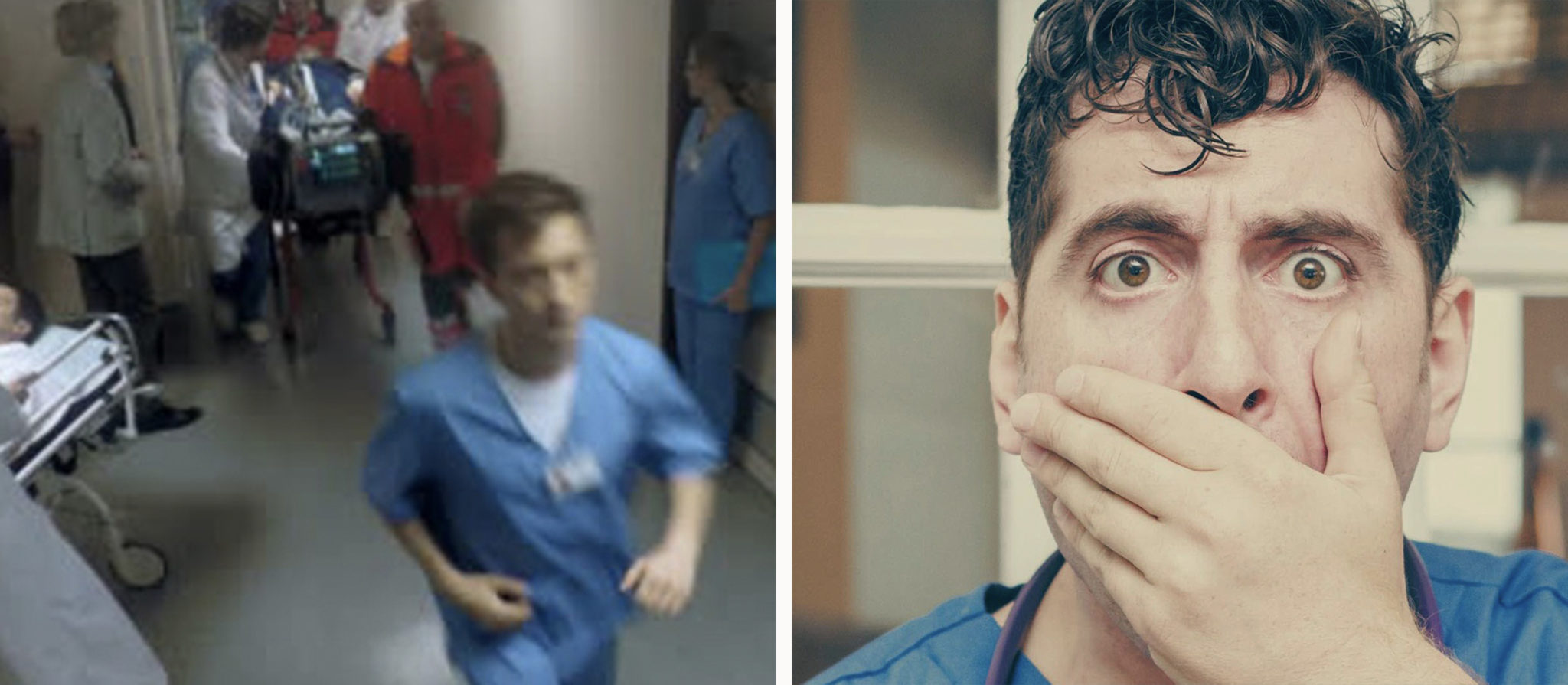Doctors Share Their Terrifying “They Didn’t Teach THAT In Medical School” Moments
These bizarre medical cases had even the best doctors paging Dr. Google.
Learning to become a doctor is hard work. Young residents are put through their paces in medical school, forcing them to confront cadavers and difficult patients from the get-go. But as soon as these students go out into the world, they quickly realize medical school can’t teach them everything. The result? These horrifying moments.

1. Toilet Training
I took care of a young man with a wound in his abdomen. He had an ostomy bag to collect his bodily waste for a while. When they finally removed it, he was so nervous because he hadn’t pooped in so long. Then, one day, his call light went off in his room.
I came in and he said, “Go look in the toilet, you’re never going to believe this!" I went in and there was his poop in the toilet! His first solid poop I had seen in over a year! I walked out and gave him the biggest hug. He was so proud of his poop. I literally had tears in my eyes. Nursing school never prepared me for crying outside of a patient’s room because I was so happy they pooped.

2. A Real Head-Scratcher
This one was fun: a patient in the ER received a standard urine substance screen. The test came back positive for ethanol, but the patient insisted he never drank a drop. The test was then repeated. Positive. The patient got very upset. He swore he did not drink. So we drew a blood test. That's when things got weird.
The results came back negative. We checked everything we could think of. Did we have the right urine? The right blood? It should be impossible to test positive on urine and negative on blood. Meanwhile, I finished his regular urinalysis. He had a high white blood cell count and really high glucose. Elevated white cells usually require microscope inspection because it could indicate an infection.
I looked and it was loaded with yeast. That’s when it all made sense to me. The man was obviously diabetic and had high sugar in his urine, along with a yeast infection in the bladder. See, the yeast was fermenting the sugar into ethanol in his bladder. He then became known as 'The Man Who Peed Beer.'
3. Getting The Stiff
When my mom was fresh out of nursing school in the 1980s, she got a job at a hospital that had a high concentration of geriatric patients. One particularly frail man took out his dentures before sleeping, then passed in the night during her shift. His cheeks were so alarmingly sunken in that my mom and another nurse tried to replace the dentures back in his mouth so as not to horrify the family.
Unfortunately, the rigor mortis had already started to set in. She said nursing school definitely didn’t prepare her for that nightmare.
4. Jack Of All Trades, Indeed
It was my first year out of my family practice residency. The specialists like to sneeringly refer to us as jacks-of-all-trades and masters of none. Anyway, I was on call from the ER, and a normally unshakable ER doctor was beside himself. He had a very pre-term mom in active labor and the fog outside that day prevented us from flying her out to a well-equipped hospital.
He was the only ER doctor, and the transferring facility wouldn't take her into transport without a physician on board, so they called me in. En route, I was trying to coach her to breathe through the contractions. Then disaster struck. She felt something coming out—it was the baby's foot. We were in the back of an ambulance when this happened.
We delivered the baby about a minute or two out of the hospital. When we got there, they were expecting a mom in pre-term labor, not a micro-preemie. One nurse met us in the ambulance bay, took a look at me holding the baby with a blanket and oxygen, and said, “Follow me". We ran through the hospital and turned on an incubator.
The pediatric doctor wasn't present at that moment and the baby's heart rate was low, so I proceeded to intubate her. That was 12 years ago. She survived and is doing great. I wrote my program director at 4 am that morning when I got back home thanking him for all the training. I think I used 100% of my training that night, and it still didn’t prepare me for everything.
5. Bedside Manner
The first time I had to tell someone their loved one didn't make it, I was not ready. Though they covered the basics of it at medical school, no one really told us how to break the bad news to someone. No one told us how impotent we'd feel doing it, or the fact that we wouldn't be able to answer their panicked questions...or what it'll be like knowing that there's nothing we can say to family members that will truly bring comfort.
There’s also nothing on how shocked or even angry you'll be when some people don't really care about their mom going downhill, or how ashamed you might feel when you look back and realize that you're becoming numb to it all yourself. Yeah, you probably had to click through some presentation on the five stages of grief at some point and listen to a generic lecture on what NOT to say, but until you've stumbled through it a few times, you're winging it, and probably poorly.
6. How To Save A Life
I did chest compressions on a daughter’s mother while the girl stood at the head of the bed, pleading that I save her mother’s life. I’ve had some form of medical training since I was 16, but using it so often in a hospital setting makes you less empathetic. I’m also a male nurse if it makes any difference. I didn’t expect to get the feels after such a critical moment in a family’s life.
The mother survived. I definitely broke most of the bones in her chest, though.
7. Thar She Blows
I was NOT prepared for the day a patient exploded in surgery and splattered all over the entire operating team. Basically, a watermelon-sized tumor was being removed from the patient. It turned out, the tumor was more of a giant cyst. The surgeon didn’t open up the belly wide enough to facilitate the thing, so imagine someone trying to dig out a giant water balloon from an eight-inch incision with their hands.
The pressure on the tumor caused it to erupt out and upwards, spraying its contents on everyone and everything in the room. On the positive side, this made the removal of the thing A LOT easier. I do recall a lot of people screaming when it happened though. The patient came out fine!
8. Show Me Your Teeth
If you have a patient in labor (or in any painful procedure) who wants to hold your hand, only let them hold two fingers. They can't squeeze them too hard and break the bones, yet they still get the comfort of human touch. I've had patients in labor pinch me, pull on my clothes, and squeeze my two fingers as hard as possible. Some are just panicked, but some seem to be angry and want to hurt someone.
I always calmly ask them to stop with the pinching or pulling on my clothes because that really isn't helping them. These are often people who have refused an epidural because they are afraid of needles. While I understand that, I myself refuse to go black and blue. I always teach the new nurses or students the two-finger trick.
Which reminds me: Several years back, I had a couple in for a delivery. I asked what method of pain control they preferred. Their response was bizarre. They looked at each other, giggled, and then he said, "She bites me". I asked for clarification, and apparently, during her first two deliveries when the contraction pain became unbearable, she would take his hand and literally bite the heck out of his knuckle.
They were both hip to this plan and oddly proud of it. Fast forward to a couple of hours—the labor was getting well advanced. I looked up while doing an exam and saw her clamp her teeth on his calloused knuckle. She appeared to be biting with full pressure. He made a bit of a face but not a sound. Soon after, we ushered their youngest into the world.
When the contraction would start, she'd take a lung full of air and push to the count of 10 while biting the heck out of her man. It worked for them, so who am I to judge, but it made me somewhat uncomfortable.
9. School’s Out
My grandmother was a school nurse at an elementary school. They were letting the kids out for the day, and all of the kids were waiting outside. One little boy's mom came to pick him up. As she was walking up to the building, she began to have a heart attack. My grandmother began CPR and sent someone to get the defibrillator. She also told another teacher to call 9-1-1.
The woman passed before the ambulance arrived. I don't think twice her time in medical school could've prepared her for that.
10. Poker Face
Sonographers have to keep a poker face a lot of times when they see something very alarming or sad on the screen. Luckily, most people have no idea what they are looking at, but they’re not allowed to give any results to patients since doctors deliver the bad news. They simply have to stay neutral. A couple of months ago, I had an ultrasound done and was talking with the sonographer about how happy I was to be having a baby.
I’ve lost many people this year and I needed some good to happen. Then I saw her face, and my blood ran cold. It wasn’t super obvious, but I knew. My baby’s heart wasn’t beating, and I didn’t see any movement. She pulled away and told me that a doctor would call me that day. It was awful for me. I remember calling my doctor a few times that day because I wanted to know those results right away.
When I finally got it, I broke down. But I still feel really awful for her. She didn’t say much, but I could really see her heartbreak too. Their job is a lot harder than most people would imagine.
11. An Unholy Terror
I had a 60-year-old female patient show up for a same-day appointment to establish care from out of state. She had no medical records and she denied having any history of taking medications. She never smoked, drank, or anything. Midway through the exam, she started telling me that she was seeing "evil lines" all over her house at all hours of the day.
She said that she was unable to cross the lines and was therefore unable to access certain parts of her house like her bathroom. She claimed to hear voices coming through the walls and feel shadows at night. She also thought her neighbors were hexing her all the time.
At some point, she started talking about the occult and freemasons ruling the world. Then, suddenly, she stopped mid-sentence, stared at me without blinking, and asked if I could perform an exorcism. Err... Sorry. I missed that section in medical school.
12. There’s A Butt
The complaint in the man’s file was rectal pain. I immediately thought hemorrhoid, abscess, or a fissure. When I saw Mr. Rectal Pain, he told me he had pain down there but had no other symptoms. I got to the examining part it was normal looking. At that point, I had to proceed with a rectal exam. The result made my jaw drop.
I digitally examined him and he instantly said, “Ow, there’s something sharp in there". Out came a fishbone. It was big too, like two or three centimeters long. I asked the patient about it and he was like, “Oh, I had red snapper a few nights ago". I put the fishbone into a specimen cup and started parading through the emergency department showing everyone what I just “fished" out of some guy's butt. Oh, and there’s a coda to this tale.
I told this story to my colleague and he proceeded to tell me how in his residency they did rectal exams on all trauma patients. One time, one of his fellow residents went to perform one and the patient said the exact same phrase: “Ow, there’s something sharp in there". But instead of a fishbone, it was a hypodermic needle. You can’t make this stuff up.
13. Agnes Gets Her Groove Back
People with dementia sometimes forget some or all of their own family members. They also forget common social decorum. By the time the patients are with us, the family realizes that the end is near, so a lot of people that weren’t always present in the patient’s life start showing up.
After the shock disappears, the family then begins to see their relative as just any other person. The grandpa, grandma, mom, dad, whatever, ceases to exist. The patient kind of becomes their true unfiltered self in a way. Some families get the bittersweet fortune of getting to see this person how their friends might see them. Not that this is always good…
At some point, it almost always turns into the patient getting rather, uh “intimate" in their conversations. Sometimes, they even hit on a younger attractive family member. People usually take it in stride and understand the situation. But there are times when the patients lose it when they find out grandma “wants a ride on him".
14. Look Out Below
As a student nurse, I observed a cesarean section when the mother had preeclampsia. The mom was awake with an epidural in place and a screen was in front of her. All went well at first. Her uterus was sewn back up and I was starting to relax...until the surgeon asked the medical student at the foot of the bed to step aside. That's when I witnessed an absolute horror.
The doctor reached in and pumped the uterus twice and hard, forcing the remaining after products out of her fast. The wall wasn’t that far from the foot of the bed, and the student had definitely been in the line of fire. The patient nor the husband didn’t seem to notice, but when the medical student and I looked at each other, she just said, “Whoa".
15. I Got This
I’ll never forget the comment my labor and delivery nurse made. I had been laboring in the tub at the hospital but wasn’t supposed to actually birth in it. When I suddenly started to feel the baby coming, my husband pulled the emergency cord and the nurses rushed in. Through the haze of baby crowning pain, I heard a panicked nurse say, “I don’t know what to do. What do we do?"
I distinctly remember laughing to myself and I heard my midwife’s calm voice say, “It’s okay, I’ve got it" as she moved past the nurse and took over.
16. The Saga Of Private Idiot
I was a combat medic in the Army. After basic schooling, I showed up to my first duty assignment. Now, as a fresh little private, I expected my job to be more oriented towards combat medicine, hence the job title. That's when I got my first taste of "Don't get your hopes up". There I was, expecting to settle in when they told me I'd be pulling medical coverage for a 15-mile ruck march.
At that point, I had a couple of thoughts: 1. Do people really walk 15 miles? 2. What the heck is medical coverage? 3. I don't even have an aid bag, how do I treat people? I got the typical response of "figure it out". I basically started looking for the friendliest faces in my medic platoon, but mind you—most of this platoon got back from Afghanistan a few months prior and they were already exposed to live combat casualties.
That meant there were no friendly faces. When you are the new private, you are underneath the bottom of the barrel, so NO ONE likes you. Long story short, after a few push-ups and stuff, I got the aid bag. I went over my notes, trying to prepare myself for gore and broken limbs. But no, this is where I truly got in over my head. It turns out, the main casualty any medic will see is a heat casualty. Apparently, the one thing these soldiers just didn't do...was drink water. Not one person drank water and because of this, guys would drop like flies.
So let's fast forward a bit. The ruck was happening, and a few miles in, I finally got my first casualty. I hopped out like Captain America with my little cool guy shades on and my helmet unbuckled, thinking I looked cooler than I actually was. In school, they covered heat casualties in about five minutes and I was asleep in class for most of the time.
So there I was, freaking out on the inside. I still tried to treat my casualty as best I can. I brought out the ice sheets, placed him in the shade, the whole shebang. I eventually got him in the truck, removed his clothes, and performed an exam. Naturally, at that point, I was feeling good about myself. "He's still alive so we good". And then I got to the one question that messed me up more than anything.
“Did you get a core temperature?" No, no I did not. This process is simple, but in training, you don't really get the full experience. See, this task requires you to spread their cheeks, maintain steady eye contact with the eye of Sauron, and insert a thermometer while holding back your own vomit.
We called it biting the silver bullet. Everyone knew about the notoriety of the silver bullet, but I was the one who had to bite it. As I was gliding it down the booty crack, I felt it give in. In my limited experience, I thought this was the bootyhole. Wrong. It was not. It was rather, what I call, a phantom hole. Everyone looked at me like I was the dumbest man to ever exist. "THERE’S ONLY ONE...HOW DO YOU MISS?"
As this exchange was occurring, the casualty was just writhing back and forth in pain because I kind of forced it in there pretty hard. I was trying to convince him that I had to go for round two, and after a fruitful conversation, I tried again. I finally got it in the right place. I just left it there for a bit while I started to do paperwork. After about five minutes, my NCO was yelling at me again".
WHY THE HECK IS THE THERMOMETER STILL IN THERE?", I sputtered out, "SARGE, I THOUGHT WE HAD TO CONSTANTLY REASSESS!" Yeah, Private Idiot, you don’t have to leave it in there. Needless to say, I had to write an apology letter for tormenting this innocent victim. For God’s sake...they never taught THAT in school.
17. Dr. Jekyll And Mr. Hyde
Some people talk while under anesthesia. Some people even scream. Honestly, it gets so bad sometimes that I used to go home in tears, especially after treating very vocal patients. The only thing that helped was when patients would wake up and tell us, “Thank you so much. That went so fast". Post-operative checks a week later when I could see the patients were still doing well helped too.
I remember asking the doctor over and over when I first started, “Are you sure they’re under, are you sure they’re numb?" Now, after a few years’ experience, I understand how much local anesthetic he used. The patients were likely numb for a few hours post-treatment.
18. A Twist Of Fate
Sometimes, even when you do everything you're told to do, tragedy happens. You are going to have an elderly patient who you know won't make it, but there is little you can do about it other than lessen the damage. There is going to be a patient’s family member you get a little too close to and you will feel hurt when they blame you for something.
You will trust your superiors and possibly get thrown under the bus for it. I had an instance where I had a new patient who arrived on my day off. The nurse gave me a very quick report about him when I came back and I was told that although he would be a little resistant, he wasn't combative. In fact, he was purposefully placed with me because I was pretty calm and often chatted with my patients.
We were short-staffed, as always. I had another nurse assisting me to transfer him, but the nurse had to leave to get an oxygen canister for him…and she never made it back. My patient got a little restless as we were waiting. I couldn't move him in his wheelchair as he was hooked up to a mounted canister, and I also couldn't leave him alone.
While I was standing there, he pulled a shocking move on me. I wound up getting punched in the eye without any warning. My glasses broke and I was stunned. I pulled the call light, but...nothing. I looked out the door but there was nobody there. I wound up using a phone to call the front desk and beg the nurse to come down because he hit me and I didn't want to be there alone.
It still took her 15 minutes. At that time, I started to realize something was seriously wrong. At some point, I went to the doctor myself. It turned out, I had a concussion, a minor cartilage break in my nose, plus a black eye and vision issues. It’s been a few months now and I've lost central vision in that eye and I have started getting spots and floaters in the opposite eye.
They're going to probably take my license soon. I’ve seen several doctors and specialists who are at a loss and don't think they can do anything. I've been told surgery wouldn't do anything because the rods and cones are pretty much gone in that eye. Plus, I have migraines daily now. I wanted to go to school to be a nurse. I'm not even 30 and now I have to give up on my dream.
Protect yourself. Little things can change your entire life.
19. Picking Up The Pieces
Nurse here. They don't teach you how to maintain honesty when your doctor skirts around a cancer diagnosis. I've had a few cases where a physician avoids questions and instead just tells the patients and families to wait and see what pathology shows. The doctor will then usually spend 30 seconds in the room giving vague information, then immediately leave me to pick up the pieces.
Patients often ask, “In your opinion, what did the doctor mean when he or she said this?" And my response is almost always straightforward—that when it presents like that, it usually means cancer. I want to be honest with them. I make sure to spend the next 30 minutes educating the patient and offering resources on what the next steps would be.
20. The Woman Who Knew Too Much
My twin sister is a nurse. She most definitely didn't learn how to care for her own dying mother in nursing college. Our mother passed from cancer, and we nursed her until the very end at home. I was very thankful that my sister is a nurse and knew what to do, but the minute my mom passed, my sister could not be in the same room.
She had already seen so much tragedy as a nurse before, but nothing could prepare her for her own mother’s passing. I think my sister questioned her choice of being a nurse after that. To me, I was seeing my mom finally being released from all the pain she was feeling. For my sister, she knew what was happening below the surface.
She knew how my mom's lungs were giving in, and that her heart was failing. The thought that she knew that hurt me inside as much as my mom's passing did. I have a lot of love and respect for my sister.
21. Just A Normal Day At The Office
I never learned how to deal with the fully-unclothed man covered in his own poop who barricaded himself in his room and started command flinging his mess at anyone who attempted to deescalate him. But I'll tell you this much—I’ve never felt more like Captain America than I have while fully gowned and equipped with a riot shield blocking flung poops coming my way.
22. A Bonding Experience
When I worked in assisted living, I had a gentleman on hospice. He was a nice guy and was as cooperative as could be. 30 minutes before leaving one day, I was doing my rounds and making sure everyone was getting dressed. This patient needed assistance, so I started doing his routine. All of a sudden, he said he needed to poop.
I asked him if he could make it to the toilet. We tried to make it, but it was in vain. We ended up in the shower just spraying every time he passed a movement because it was the easiest solution. It was absolutely one of the worst things I’ve dealt with in my life. It seemed like it would never end. I ended up getting him cleaned up and in his freshly cleaned wheelchair.
Meanwhile, I stripped his bedding and the rest of the linen casualties that we’d amassed during this adventure. I tucked him into his fresh bed and told him I’d see him that night. My co-worker had the absolute balls to ask where the heck had I been while I carried all of his linen to the laundry. I told her to bug off because I had just handled the poo explosion of my nightmares completely solo.
Still, he and I became quite good friends after that. That kind of thing will bring two people together.
23. The Cleanse
I had a patient with a terrible infection at an injection site. I watched in fascination, horror, and disgust as the surgeon squeezed the patient's arm and thick pus slowly squirted out of the incision. It was like squeezing a tube of toothpaste. To be honest, I found it to be really satisfying because here was this nasty infection that could really harm this person and it was being cleaned out. I could feel the person feeling better as it was being cleaned.
24. Dangerous Liaisons
I’ve learned that people will literally stick ANYTHING up their butt and the operating crew will get called out on a beautiful weekend day because of it. Every. Single. Time. Then, as they are going up to the floor to wheel the patient down for surgery, the patient will invariably greet them with, “Hi, I’m the village idiot". Yes...yes you are, and you just bought yourself a permanent colostomy bag.
25. A Punch To The Gut
I used to be a pathology collector, so I basically collected patient bits and test them. One fellow needed some nail clippings and scrapings done for fungal testing. We used to see this a lot when it warmed up and people broke out their sandals...But this guy needed it for his hands. His nails were yellowed and starting to deform, and there was a smelly cheese-like substance under them.
Every. Single. Finger. It was the first and only time I ever had to try not to dry retch in front of a patient.
26. Torn Apart
My young, newly-married patient got in a bad motorcycle crash with her husband. She survived and her husband didn't. She woke up and started yelling, "Where's my husband?!" Then it got worse. See, we couldn't tell her that he didn't make it, as only the doctor could do that. Unfortunately, the doctor couldn't come up for three hours.
So for three excruciating hours, we couldn't tell her anything. I would walk into her room knowing that her life was about to be destroyed. My gut hurt just thinking about it. I'd ask her, "Can I get you anything, ma'am?" and she'd reply, "I just want to know where my husband is. Is he okay?" I would tell her that I wasn't sure, but no matter how hard I tried to poker face it, I think she could tell in my voice that he was gone. There's no chapter on that in any textbook.
27. Fancy Seeing You Here
One of my patients was having pain whenever she peed. I did a standard UTI and STI panel, particularly for chlamydia. It was a self-test, so I had to explain to him the basic procedure of inserting the swab and twirling. The poor guy was so uncomfortable—not that I blame him—but my hardest task was explaining it all with a straight face. He had come from work so he was still in “uniform". He was a priest.
28. Cradle To The Grave
When my wife started out as a fully-fledged registered nurse, her first job was in an aged care facility. She said the hardest part was getting used to working with people with dementia and the things that they'd do. For example, she had residents who would eat their own poop—she had to go home early after that one because she was so sick for the rest of the day.
There was another resident who once walked down the hallway with poop in her hands. She had no idea what it was or how it got there. They had to remove the Christmas tree from the dementia ward after another resident peed on it. But those aren't even the worst cases. The toughest ones to handle, however, were the violent or aggressive residents; many of whom were (according to their families) sweet, loving people before they got sick.
She also had one resident who apparently was an angry jerk before he got dementia but then turned into a kind, lovely old man, so I guess it can go both ways. In a way, you sort of understand them though. If you have no idea who anyone is or what is going on, it would be very distressing if a random stranger takes your clothes off against your will every day and then puts you under a shower.
It was also really distressing for her to help residents who couldn't remember that their spouses had passed. They would ask every 20 minutes where their husband or wife was because they couldn't find them. Apparently, nurses learn quickly that the easiest answer is just to lie. “She's just gone to the pharmacy to get some medicine, she'll be back soon".
One family tried to be helpful by making a very beautiful photo album for their grandpa showing a lot of photos of him and his wife together. They finished the book with photos of him at her funeral to help him remember that she had gone. The only problem is, things like that tend to just make people re-live losing their loved one over and over again each day, so the nurses found it easier to just lie.
So in short, many aged care facilities are terrible; but if you can find a good one with good nurses and good staff, your loved ones will be treated extremely well with people who love and care for them.
29. A Tale Of Two Families
Working in the ICU, I see mortality all the time and have essentially become numb to it. I've also seen the very best and worst of the process demonstrated by family members. The best case: I had a family whose father had stage 4 (end-stage) liver cancer with metastasis to the lungs and the pancreas.
He was experiencing horrible pain but was he was also utterly exhausted from his years of chemo and treatment. He finally said enough was enough and made the decision to move to comfort care. For those who don't know, comfort care is when we withdraw any form of invasive treatment from a patient. We switch them to primarily pain control only.
This one patient, let's call him Bill, through a quiet whisper, made the decision to go to comfort care. He wanted us to contact his family to come and see him. The staff agreed and they called his family who were able to make the trip. One by one, the sons, daughters, grandkids, and even the great-grandkids went into the room on their own to say their goodbyes.
Before he passed, Bill wanted to have a glass of merlot with his family. So Bill’s son drove as fast as he could to a nearby store and bought the cheapest boxed stuff he could find. Together, the family sipped on a cheap glass and enjoyed the presence and stories of their beloved Bill. A short while after, through tears, Bill's family watched him slowly and peacefully slip away.
What truly stuck with me during this event was how the family acted during Bill’s passing. They weren't saying, "Come on Bill! You're gonna beat this! Keep fighting!" etc. Instead, they encouraged him to relax, saying, "It's okay Bill, we love you so much. You don't have to keep fighting anymore". They all knew his body was failing, and so did Bill.
Before he passed, Bill’s whole family was present and enjoyed being with him until the very end. While there was mourning, and rightfully so, there was also a sense of joy and peace. Now the bad: We had a patient who also had end-stage cancer of the lungs with metastasis to the liver and bones. We will call her Jen.
Jen was in constant, excruciating pain. The only audible noise she'd make was a moan during each expiration. Due to her condition, Jen required aggressive blood pressure support and breathing assistance using a mask. Her family was adamant about the aggressive treatment of the patient, thinking that her condition could be fixed somehow.
Even after an extensive explanation of Jen’s condition, the family was still certain they wanted to treat her. So we did. What I remember is how the family, even after being told the patient was dying and that nothing we could do was going to help, was blinded by their expectations.
For whatever reason, they couldn't comprehend that end-stage cancer is not curable and that specifically bone and liver cancer are going to have extensive effects on the rest of the body. Even though Jen, the patient, was moaning in agony, the family insisted on continuing treatment. Because Jen was not making comprehensible sentences, we had to follow the family’s direction.
The staff could not look the family in the eyes because each one of us believed that what the family was doing was atrocious and inhumane. Eventually, Jen passed and her family was still upset with staff for not making her better. The family members were yelling at each other, criticizing each other for not doing this or that.
Instead of being at peace, all we saw was anger. I was never taught in school how to handle either one of those family dynamics. Nobody explained how to navigate difficult conversations in a professional and honest way. I see mortality every day and have come to realize that even though there is grief, there can also be happiness.
30. Let It Go
On my first day on a new ward, an older woman rang the buzzer in the bathroom. Me being keen to impress, I ran straight to her. I was confronted with a wall of smell and what looked like an explosion of poop...everywhere. Up the walls, just everywhere. Turns out, she didn't think she needed her laxatives the past few days, so she hid them.
The doctors, wondering why they weren't working, increased her dose...then she took them all at once when she felt bunged up. Oh, and she had also been eating an abundance of fruit. I had to use several disposable mops to reach parts of the wall. Honestly, I've never seen anything like it before or since. Luckily, I work in neonatal now.
31. Infamous Last Words
I was a new nurse cleaning up a deceased patient. I went to turn her over and she let out a horrendous groan. Did know you could force air over the vocal cords of a cadaver? I did not, and I almost pooped myself in my scrubs.
32. A Parting Gift
Hospice pharmacist here. Pharmacy school never really prepared me for hospice care in general. Overall, I love my patients and their families, and I have become very close to them. Once, I had a patient who had a daughter in her mid-20s and we all loved to sit in his room with his family. They were so friendly and loving.
A few days into his stay, the patient asked me what I depended on my dad to tell me when I was younger. I told him that I needed my dad to educate me on a bunch of car stuff, money decisions; you know, basic dad things. A few days later, he gave his daughter a heartbreaking gift. It was a book of things she needed to know for when he was gone. I still think of that family to this day.
33. A Leg Up
We had a patient who was homeless and taken to our ER. During that time, we found out that he had stage 4 metastatic cancer with only a few weeks or months left to live. Our unit was a short-term stay unit, so we kept the guy. At the time, he had been off his anti-psychotic medications and we needed to restart them. But…it was a tough transition.
For a short time, we had to take away his prosthetic leg because he would throw it at anyone who walked in the room. We, of course, made sure he got up and around with a wheelchair, but never in school did they tell me a prosthetic leg may be used against you.
34. Sugar Pie Honey Bum
I did not know that a rectal prolapse can be treated with sugar. Depending on the extent of the prolapse, surgery is usually the only option. But one rudimentary method for a non-surgical repair is just putting sugar on it. Pouring sugar on it draws fluid out by simple principles of fluid dynamics—salt would also work, but that would be quite masochistic.
This shrinks the prolapse so it is easier to place back and also less painful for the patient. So, well, that is how I found myself opening a handful of sugar packets into a cup for a doctor at 2 am as an undergrad while working in an emergency room.
35. Mind Games
I cared for a patient who had gallbladder issues. About three days into his stay, he complained of bugs in his room. Then his tragic history came out. We weren’t aware that he was an alcoholic and withdrawal was setting in—his intake interview records simply listed: “Sometimes a few drinks after work".
The patient threatened everyone who approached him, and he refused all meds including the sedatives which are used to treat withdrawals. Soon, he moved his roommate’s bed (with the roommate in it) to the room’s closed door and barricaded them both inside the room. The roommate was quite ill, had IVs running, and needed a breathing treatment.
I was really worried about both of them as that kind of withdrawal can be life-threatening. We were all totally clueless about how to deal with this. Security had started trying to break through the door, but that was only making the patient more agitated and more of a threat to his roommate.
We were a teaching hospital, so a psych resident was sent to the unit. The resident was young and I did not have much confidence in his ability to be useful. He ordered all personnel to be quiet and started to talk to the withdrawal patient through the door. Within 10 minutes, the patient had opened the door to the resident.
Within another 10 minutes, he let staff in to care for his roommate and accepted sedation for himself. Since then, I have great respect for the skill of a trained practitioner of psychology.
36. It Hits The Fan
From the reverse perspective, my family tends to entertain the ER with emergencies nobody expects. One time, I gave myself a concussion and whiplash—from a ceiling fan. I broke it on my skull, knocked myself out for like 30 seconds, and then had migraines nonstop for eight days. Surprise, ER! So many people in the ER kept stopping by to ask me my story and laugh about it like, "Now I've seen everything!"
37. If It Ain’t Broke, Don’t Break It
Patient here. One time, one of my nurses didn’t know how to give me my new medication. It was an Epi-Pen, and honestly, they're not that hard to administer, but she and the other nurses were playing around with it outside trying to figure it out. That's when the worst happened. They accidentally set it off—a $1,500 pen of allergy medication.
The doctor was NOT too pleased, and the nurse even tried to lie her way out of it, saying the pen was “defective". My dad had to tell the doctor the truth. I was sitting there, half finding it hilarious, and half super angry because I’d been waiting for the medication for four days and then had to wait even longer.
38. Words Of Wisdom
In hospice, if you whisper "It's OK, you can go. I will take care of your family" to someone who is "active" (actively passing), they pass a lot faster and more peacefully. Hugging the primary caregivers and telling them "You did such a good job" can also really help them positively process what’s happening.
39. Things Fall Apart
Nurse here. You learn everything about the human body in school. Anatomically, physiologically, you know it all. However, you don't learn about the real emotional side of health care until you actually get out there. I had a patient who was depressed and got into a physical altercation. The county lockup brought him to our hospital for complaints of chest pain.
He was a sweet guy. He was a lawyer many years ago, and during a case where gangs were involved, the group he was prosecuting shot up his law office and killed his assistant. He had a psychological break. He lost his law license and started hanging with the wrong crowd. He had no family, so he was basically all alone. The guy's lack of emotional stability resulted in him not being able to catch a break.
As it turned out, the chest pain was due to anxiety. His toxicology was clean, but he just couldn't get himself out of this hole. I really felt bad for him. He lost everything and struggled to get himself into a good place. I did everything I could to see if I could get him transferred to a behavioral unit so he could get the help he needed, but the admitting doctor said he didn't qualify.
I had to wake him up at three in the morning to tell him that he would be discharged and be going back behind bars. It was one of the hardest things I had to do. It was even harder than telling a family member their loved one wasn't going to make it and they should say goodbye.
40. His Cup Spilleth Over
I was still in nursing school at the time this happened and I worked as a nurse’s aide overnights. I had been taking care of this really lovely old guy, and we had some great conversations. He was “with it" and doing well. In the morning, he had told me that he hadn’t slept well and was really looking forward to getting coffee from the cafeteria people.
Later that day, his call light went off and I went to check on him. When I opened the door, he said, “I think I spilled my coffee". When I realized what it really was, the blood drained from my face. I turned on the light and there was poop everywhere. All over him, all over the walls, a bit on the ceiling, all over the bed, and on the floor. He was holding his cup of coffee, which also had poop all over it, and he was just looking at me.
41. Sic Transit Gloria
Actually, pretty much everything I saw and did when working in oncology was new to me after medical school. It was the most amazing, rewarding, messed up, and emotional thing I've ever done. One day, I was leaving work for two weeks of holidays and said goodbye to my patient who I'd been looking after for the last week.
Both of us knew it was the last time we would see each other, as he wouldn't last two weeks. I can't even explain how much it affected me. He didn't want to pass and he was an absolute legend. That was four years ago. I think of him all the time; he was stopping treatment a few days after my holidays and going home to have a party with his buddies from the soccer club.
42. Choose Your Words
We are taught to explain to patients exactly what we are doing, as we are doing it, so delicate wording becomes important during female pelvic exams. Instead of, "Okay, I am going to place the speculum inside now, so you'll just feel some warm pressure," my buddy—who was new at this—ended up saying "Okay, I'm going inside you now".
The female patient responds, "No thanks, I already have three children".
43. A Real Tear-Jerker
I'm not a doctor, but a pharmacy technician. About a year ago, a young woman who came in was very upset. She turned in a prescription for a bunch of anti-anxiety and anti-psychosis medications. All was going well until I realized we were out of one of them. I had to tell her that I needed to order it for the next day. She was OK with it at first, but then I saw the rage flooding her eyes.
I asked her if she was OK and she said yes, so I continued typing up the prescriptions. The next thing I knew, she began crying. She started telling me that she was just released from a psych ward and she had tried to harm herself a couple of weeks back. She rolled up her sleeves and her arms were covered in deep cuts. She began to ask me if I thought she would ever get re-accepted to nursing school.
Apparently, they kick you out if you get admitted to the hospital for psychological symptoms. I had no idea what to tell her except that I hoped she got in and that if she worked hard, they should give her a chance. I know this all may sound shallow, but I was not prepared for this. Nothing in pharmacy tech training told me how to react.
44. Cat’s Cradle
When you have to euthanize a 91-year-old woman’s ancient cat who belonged to her husband; then, when you set the cat on the hospital blanket, you ask the sweet old woman who lost her husband and daughter in the same month, “Would you like your blanket back?" And she answers with tears in her eyes, “I just want my family back". No, it doesn’t get easier.
45. Cruel To Be Kind
Before practicing, I use to think someone dying was the worst possible outcome. After working in the ICU for 10 years, I feel as though the staff is sometimes forced to prolong life despite the morality of it. I would even go as far as to say we put patients through long, arduous torment and suffering. For example, I took care of this patient in a neurosurgical ICU that had a massive brain aneurysm that ruptured.
He came to the hospital and went straight to the operating room to remove large parts of the skull to allow for his brain swelling. Weeks went by and the patient never recovered. The patient only had some minimal reflexes. He was basically unresponsive—he couldn't move any of his extremities. However, the patient was not clinically brain dead.
Despite many meetings between the healthcare staff and the family about the severity of the injury and the 0% chance of the patient having a meaningful recovery, the family decided that they wanted us to do all that we could to sustain his life. It all went wrong in the worst ways. Over three months of being in the ICU, the patient developed huge bed sores from not being able to be turned due to his critical injuries.
He also developed necrotic appendages in his feet, ears, hands, and nose as well as worsening swelling of the brain. It became so prominent that the patient's head incisions started to split open. Eventually, multi-organ failure set in and he ended up passing via a slow, painful end. Such a horrible situation, and one that I regret to this day.
46. One Flew Over The Cuckoo’s Nest
I was a psych nurse for nearly two years, and honestly, we learn very little about psychology in school. The clinical lessons were basically useless, so there was a lot I had to learn as I went...like how to stay calm when you’re cutting a pillowcase off someone’s neck that they tried to hang themselves with, or how to deal with a psychotic teenager who’s bigger than you punching holes in the drywall and then using the pieces as weapons.
Or what to do when you walk into the dark day room at 3 am to find your patient perched on top of the giant TV near the ceiling like he’s schizophrenic Batman. Yeah, there was never a dull day.
47. Ice Cold
A resident at my nursing home had hemorrhoids, and they were reportedly bleeding at the beginning of my shift. I called in some medicine for her, but it didn’t come in that night. When I checked on her, she seemed fine, so I assumed she could wait. I passed the information about the situation to the next shift and went home. That was a big mistake, apparently.
I got called into the office the next day and my boss yelled at me about it. I followed protocol and charted the situation accurately, so I was super confused about what the problem was. They then asked me, “Why didn't you just put an ice cube in her?"...WHAT. “An ice cube?" I exclaimed. “Yes," they said, “Didn't you learn that in school?" Ummm no...
48. The Rear View
Nurse here. A very panicked nursing assistant came running to the desk one day, saying, “You have to see this! I don’t know what this is!" She then brought me into a private room where she was giving the patient a bath. She pointed to an area on the patient’s buttocks. “What is that?" I leaned in for a closer inspection, and my face went white.
The patient then started to turn back around and said, “IS THAT MY EYE?!" Sure enough, my patient had a prosthetic eye that came out of the socket at some point and it became suction-cupped to her buttock. I left the room and had never laughed so hard in my life. Truly one of the most bizarre and hilarious moments in my career.
49. All Eyes On Me
Medical school didn’t teach me how to put a fake eye back in. A patient came in from a not-so-nice nursing home with a multitude of problems, one of which was a disgusting, draining fake eye that had to be removed for treatment. Upon discharge, we had to put it back in. Simple enough…or so we thought. We had no idea how to do it and struggled to figure it out.
I suppose that is why the nursing home staff never took it out to clean it in the first place. This was decades ago, though. Fake eye technology is probably much better today.
50. The Line Of Fire
I was in my first year of X-ray school at a community hospital in a mid-sized city. I didn't even know what an enema was before one of the technologists asked me if I wanted to shadow and watch one get done on a 92-year-old lady. I said of course! I watched them help this little white-haired lady get onto the hard table with just a sheet under her.
I then acted super interested so as to look like a star student, but inside I was screaming. What a horrible and disgusting test! I'm so glad I was oblivious to gastrointestinal studies before deciding to go through with X-ray school—I might have decided on another career path. Somehow, though it got worse. No one told me not to stand in the line of fire when we rolled the teeny frail old woman onto her left side...
Let’s just say that I am glad I kept my mouth closed. I was quickly and very quietly guided out of the room, up to the showers, given scrubs to change into, and given the rest of the clinical day off scot-free. My $60 school clinical scrubs were a total loss and put in biohazard trash. I am pretty sure I showered for several hours following getting back to campus.
51. That's No Scratch
I'm a nurse, but I was working in the ER when a guy came in for a scratch on his neck and "feeling drowsy". We start the usual workups and this dude's blood pressure TANKED. We scrambled, but he was gone within ten minutes of walking through the door. Turns out the "scratch" was an exit wound of a .22 caliber round.
The guy didn't even know he'd been shot. When the coroner's report came back, we found that he'd been shot in the leg and the round tracked through his torso shredding everything in between. There was really nothing we could've done, but that was a serious "what the heck just happened" moment.
Sources: ,




























































